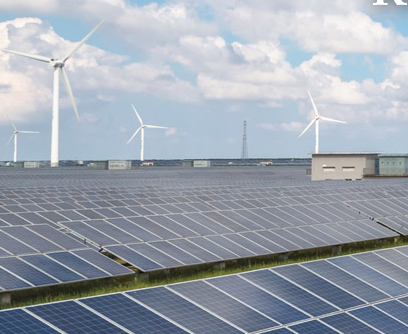In its new report, Energy Transition Outlook: Renewables Power and Energy, industry analysts DNV GL predict that solar will be a leading source of energy by 2050, responsible for around one third of the global electricity supply.
The report, the first edition of a new annual publication from DNV GL, aims to forecast the ‘most likely’ future for energy through to 2050. Its key findings are that overall energy demand will stop growing within the next 15 years – thanks to increased efficiency and slower population/productivity growth, that much of the existing demand will shift to electricity – as the transport and heating sectors are increasingly electrified, and that the electricity supply will be dominated by renewables – responsible for 85% globally.
“The very large increases in PV and wind capacity do not appear to introduce any insuperable new issues in order to maintain secure electricity systems,” states the report. “Such major penetration is beginning to take place in various European grids, and the system operators have shown themselves capable of addressing problems. As penetration increases further, so will innovation.”
Popular content
Despite this positive outlook for solar and other renewable energy sources, the report warns that climate objectives laid out in the Paris Agreement will not be met on the current trajectory. The report forecasts that the ‘carbon budget’ – the amount of CO2 that can be emitted without risking major climate change – set out for 2050 will likely be exhausted by 2041.
“Our report shows that the energy industry, more than any other, has the power and knowledge to manage the world’s carbon budget in a smarter way,” says DNV GL CEO Ditlev Engel. “Until 2050 the electricity share of energy demand will grow from 18% to 40%, yet this transformation is not happening fast enough. Speeding up the acceleration by decarbonization of heat and transport will be one vital measure to put the brakes on global warming. But climate change is not only an engineering challenge, but also one of governance. We call upon all stakeholders to maximize the decarbonization of their operations.”
This content is protected by copyright and may not be reused. If you want to cooperate with us and would like to reuse some of our content, please contact: editors@pv-magazine.com.



1 comment
By submitting this form you agree to pv magazine using your data for the purposes of publishing your comment.
Your personal data will only be disclosed or otherwise transmitted to third parties for the purposes of spam filtering or if this is necessary for technical maintenance of the website. Any other transfer to third parties will not take place unless this is justified on the basis of applicable data protection regulations or if pv magazine is legally obliged to do so.
You may revoke this consent at any time with effect for the future, in which case your personal data will be deleted immediately. Otherwise, your data will be deleted if pv magazine has processed your request or the purpose of data storage is fulfilled.
Further information on data privacy can be found in our Data Protection Policy.